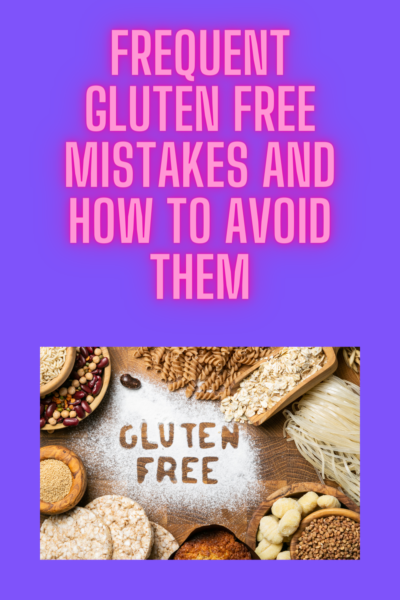In recent years, the popularity of gluten free diets has skyrocketed. Whether it’s due to medical conditions like celiac disease or personal preferences, more and more people are eliminating gluten from their diets. However, despite the growing awareness, there are still numerous mistakes that people make when navigating the gluten-free lifestyle. In this blog post, we will explore some common gluten free mistakes and provide helpful tips to avoid them.
- Lack of Awareness and Education:
One of the primary mistakes individuals make is a lack of awareness and education about gluten-containing ingredients. Gluten can hide in unexpected places, such as sauces, condiments, and processed foods. Failing to understand the various names for gluten, such as malt, wheat starch, and barley, can lead to accidental consumption. To avoid this, it’s crucial to educate yourself about gluten-containing ingredients and carefully read food labels. Some of the most common items that often have gluten that people don’t normaly think of include: canned soups, salad dressings, licorce (yes gluten free licorce exists but it’s not common as there is wheat flour in regular licorce), corn muffins (and other corn flour products, often they have corn and wheat in them).
- Cross-Contamination:
Cross-contamination occurs when gluten-free foods come into contact with gluten-containing products, surfaces, or utensils. This can happen during food preparation, cooking, or even when dining out. To minimize the risk, establish a gluten-free zone in your kitchen, separate utensils and cookware, and use dedicated cutting boards and toasters. When eating out, communicate your dietary needs to the restaurant staff and inquire about their cross-contamination prevention practices. Asking if the restaurant has a dedicated fryer is one key thing to make sure to minimize your risk. If you have severe reactions you may even need to use separate pans at home that have never had any gluten in them.
- Relying Heavily on Processed Gluten-Free Products:
While there is an abundance of gluten-free products available in stores today, it’s important not to rely heavily on them. Many processed gluten-free products are often high in sugar, unhealthy fats, and artificial additives, which can negatively impact your overall health. Just because the product is gluten free doesn’t mean healthy. I made this gluten free mistake when I first went gluten free. Instead, focus on incorporating whole, naturally gluten-free foods into your diet, such as fruits, vegetables, lean proteins, nuts, and seeds. Experiment with gluten-free grains like quinoa, millet, and brown rice to diversify your meals.
- Neglecting Nutritional Balance:
When transitioning to a gluten-free diet, some individuals unintentionally neglect proper nutritional balance. Cutting out gluten doesn’t automatically guarantee a healthy diet. It’s essential to ensure you’re getting all the necessary nutrients from other sources. Consult a registered dietitian to create a well-rounded meal plan that meets your nutritional needs, including a good balance of carbohydrates, proteins, healthy fats, vitamins, and minerals. Even though many people cannot tolerate gluten, it does have nutrients in it, so you need to make sure that by going gluten free you still get adequate vitamin D, and other minerals and vitamins that many people are often deficient in.
- Assuming All Gluten-Free Foods Are Healthy:
Many people assume that gluten-free automatically translates to healthy. However, this is far from the truth. Gluten-free cookies, cakes, and snacks can still be high in calories, sugar, and unhealthy fats. It’s important to read labels and choose nutrient-dense gluten-free alternatives or, even better, prepare homemade gluten-free versions using wholesome ingredients. In fact, many gluten free foods can be worse for your health than those with gluten. I always read labels and you need to do this too.
- Lack of Communication:
Another mistake is failing to communicate your dietary needs effectively to friends, family, and restaurants. Some people may not fully understand the severity of celiac disease or the importance of a gluten-free diet. By clearly explaining your requirements and sharing reliable resources, you can avoid uncomfortable situations and ensure that others take your dietary restrictions seriously. Too many people still think of a gluten free diet and lifestyle as a fad and it is important to let people know it really is a health issue for you and you aren’t doing it just to be popular or because you heard you could lose weight or other non serious reasons.
Transitioning to a gluten free lifestyle requires attention, education, and a mindful approach. By avoiding common gluten free mistakes like lacking awareness, cross-contamination, over-reliance on processed foods, neglecting nutritional balance, assuming all gluten-free foods are healthy, and failing to communicate effectively, you can enjoy the benefits of a gluten-free diet while maintaining overall well-being. Remember, if you have specific health concerns or questions, consult a healthcare professional or a registered dietitian for personalized advice.
Request a free foundations of wellness supplements kit.
Autoimmune Healing Blueprint Kit with Ebooks and Video
Did you find this helpful? Donate to help me be able to continue writing more content.
My Favorite Products (Affiliate links- if you make a purchase I may earn a small commission)
Thrive Market - healthy gluten free, sugar free and speciality online food and household products
Silk and Sonder Monthly Journals and Planners
My Portable Infrared Sauna
Self Care Journal
Olipop - healthy soda with probiotics and prebiotics
Digestion Kit
Stress Oils










